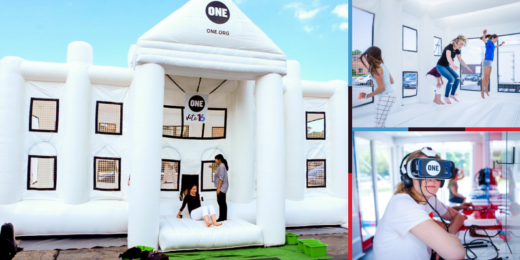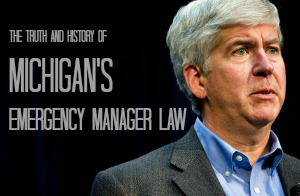On Wednesday evening, representatives from the ONE Vote ‘16 Caravan will be pulling into Ypsilanti’s Cultivate Coffee and Tap House and engaging local voters in a discussion about global poverty and how critical it is that our elected leaders take the problem seriously. Following is my discussion with Juliet Vedral, the U.S./Canada Press Secretary for the ONE Campaign to end extreme poverty.
MARK: So, do I understand correctly that the ONE Vote ‘16 Caravan will be making a stop in Ypsilanti this Wednesday evening?
JULIET: Yes, the ONE Vote ‘16 Caravan will be at Cultivate Coffee and Tap House from 5:00 p.m. to 8:00 p.m. tomorrow… The caravan features an adult-sized White House “bounce house” and a virtual reality experience that takes viewers into the day-to-day of a young girl and a woman living in extreme poverty in sub-Saharan Africa.
MARK: Would I be right to assume that the purpose of the Caravan is to engage people in conversations about global poverty and hunger prior to our November elections, with the hope that voters might then be more likely to support candidates who are serious about addressing those problems?
JULIET: Yes. We believe that the next president ought to have a strategy for fighting extreme poverty, especially in Africa, and every candidate for commander-in-chief should articulate that strategy for voters. Why? Because helping people climb out of extreme poverty and stopping the spread of preventable diseases is an important part of American foreign policy and our national security. Fighting poverty makes America safer. Helping poor countries build better health systems will stop the next Ebola from reaching us. And helping developing countries build stronger economies and democratic institutions will prevent terrorists groups from growing and festering in power vacuums.
MARK: I’ve seen the phrase “Poverty is Sexist” in some of your materials, and I’m wondering if you might be able to elaborate a bit on that.
JULIET: Poverty and gender inequality go hand-in-hand. Being born in a poor country and being born female is basically a double whammy for girls and women: they are significantly worse off than their counterparts in richer countries, and in every sphere they are hit harder by poverty than men. For example, women and girls constitute roughly half of the world’s population, but are hit the hardest by infectious diseases. In many parts of the world, adolescent girls and young women are at a much greater risk of contracting HIV than boys and men of the same age because of exploitative attitudes toward sex, the prominence of intimate partner violence, and the inaccessibility of education. Nowhere is this trend more problematic than in sub-Saharan Africa, where young women are twice as likely as young men to live with HIV and where 5,000 young women are infected with HIV each week. That’s more than 700 per day. Among adolescents in Africa, girls account for three-quarters of all new HIV infections.
But there’s good news–investments targeted towards girls and women pay dividends in lifting everyone out of poverty more quickly, and are essential in the overall fight to end extreme poverty everywhere.
MARK: Given everything that we’re dealing with here in the United State right now, do you think it’s likely that global poverty will even get a mention during the upcoming Clinton/Trump debates? I don’t seem to recall it having come up at all in the primary debates, except for maybe a passing mention in relation to terrorism, and the fact that poverty can, in some instances, contribute toward radicalization.
JULIET: We certainly hope it’s mentioned! Military leaders say that America’s development efforts make us safer. So should the candidates. We believe that no one should get to be President of the United States without publicly demonstrating an understanding and appreciation for the essential role of promoting hope in securing America.
A key factor in whether this topic will come up in the debates hinges on whether voters demand answers from the candidates. Which is why we’re traveling to key battleground states and congressional districts to engage voters.
MARK: As we’ve discussed here on the site before, it’s rare that poverty within the United States is even mentioned on during presidential campaigns, let alone global poverty. It just seems like an almost impossible task to get it on the national agenda… Do you see encouraging signs?
JULIET: Well, Secretary Clinton recorded a video for us explaining what she’d do to end extreme poverty in Africa. You can watch that here.
MARK: To your knowledge, has Trump ever discussed his views on America’s role in fighting global poverty?
JULIET: We would love to have Mr. Trump also record a video for us describing how he’d tackle extreme poverty, if elected president.
MARK: Would I be right to assume that Ypsilanti won’t be the Caravan’s first stop?
JULIET: That’s right. We started our caravan in Cleveland at the Republican National Convention in July. And, since then, in addition to a few stops around Washington DC, we’ve gone to Philadelphia for the Democratic National Convention, Great Neck (NY), Wilmington (DE), Pittsburgh, and Chicago. The caravan has also stopped at Michigan State University and the University of Michigan. But we’re very much looking forward to engaging with Ypsilanti voters.
MARK: And how have you found the experience thus far? Are you finding people receptive to your message?
JULIET: Yes! We’ve have almost 1,000 people sign our petition. We’ve also had 1,729 people cast their votes to end extreme poverty using “ballots” that describe how they would want the next president to go about making a plan to end extreme poverty. And well, it’s also an adult-sized bounce house, and that’s definitely drawn a lot of people.
MARK: How do you respond to people that you meet during stops like the one coming up tomorrow in Ypsilanti when they ask, “Why should people in the United States care about global poverty?” How do you get people to think beyond themselves, and the challenges that they’re facing personally, to consider something like global poverty?
JULIET: We don’t at all want to diminish the struggle that many Americans are facing. There are an array of amazing groups here in the United States that do incredible work trying to help poor Americans. But ONE exists to try to help those living in extreme poverty elsewhere in the world.
The extreme type of poverty we’re talking about affects people who earn less than about $2 a day and live in places where there simply aren’t hospitals and ambulances and doctors; or where they aren’t supermarkets or food supplies; or where there isn’t clean water, or basic roads. It’s very different than even the worst kinds of poverty we see in some parts of the United States.
Our VR experience–two films that depict a day in the life of a young girl trying to get an education and a 40-year old woman named Doris who is HIV-positive–is a way for people to immerse themselves in the lives of people living with extreme poverty in sub-Saharan Africa. We’re hoping that viewers will get even a small sense of that experience and take action to end it.
MARK: Given everything we know about poverty and it’s causes globally, what, in your opinion, is the best approach toward taking it on? Is education the key? Or would be be better served to focus on debt forgiveness? And, I should add, I understand that, ideally, we’d do a number of things. I’m just curious to know, as someone who studies this, what you think would be the most impactful.
JULIET: Here’s what ending poverty could look like: ending hunger and improving nutrition; stopping the spread of diseases and expanding access to health care; strengthening education and growing economic opportunity; promoting justice and building stronger institutions; and it means prioritizing girls and women, who are actually the key to breaking the intergenerational cycle of poverty.
MARK: The Caravan is a project underwritten by ONE, correct?
JULIET: Yes. The caravan is part of ONE’s election program, ONE Vote.
MARK: And how did the idea for the Caravan come about?
JULIET: We were looking for creative ways to bring this issue to voters. The bounce house seemed like a fun way to engage people and to drive home the point–that whoever next enters the White House, must have a plan to end extreme poverty.
MARK: Assuming there are people who read this who can’t come out tomorrow to meet with you in person, what would you like for them to know about the fight against global poverty? What can people do to get involved?
JULIET: People can check out our websites: onevote16.org and one.org and read up on the issues. There are also ways for someone to take action, if they wanted to.
MARK: And what can those who do come to the event tomorrow expect to find when they arrive at Cultivate? Do you have non-“bounce house” activities planned? Will people be writing letters to their elected officials about specific legislative initiatives targeted at global poverty and hunger?
JULIET: Participants will be given the opportunity to immerse themselves into the issues through our VR experience. Then they’ll be asked to cast their votes to end extreme poverty. (The ballots I mentioned before will be given to the candidates at some point, and, yes, there are also ballots available if you want to petition Gary Johnson or Jill Stein.) After that, they’re welcome to bounce in the “White House” for however long they want… or can. (It can be an intense leg workout, the more you do it.)
[For more information, see Cultivate’s Facebook event page.]













4 Comments
I understand the necessity of the bounce house as it draws people in but I find it depressing that we Americans need to be entertained in order to care.
Likewise, it depresses me that we need to invoke national security to get people interested in extreme poverty. It’s apparently not enough that people are dying around the world.
According to World Bank data, we’ve been making progress.
“According to the most recent estimates, in 2012, 12.7 percent of the world’s population lived at or below $1.90 a day. That’s down from 37 percent in 1990 and 44 percent in 1981.”
Maybe we need a universal basic income?